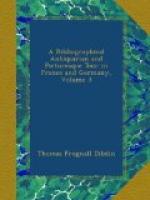The sun had set, and the night was coming on apace, after we left Bischoffsheim, and turned from the high road on the left, leading to Rastadt to take the right, for Baden. For the advantage of a nearer cut, we again turned to the right—and passed through a forest of about a league in length. It was now quite dark and late: and if robbers were abroad, this surely was the hour and the place for a successful attack upon defenceless travellers. The postboy struck a light, to enjoy the comfort of his pipe, which he quickly put to his mouth, and of which the light and scent were equally cheering and pleasant. We were so completely hemmed in by trees, that their branches brushed strongly in our faces, as we rolled swiftly along. Every thing was enveloped in silence and darkness: but the age of banditti, as well as of chivalry—at least in Germany—appears to be “gone.” We sallied forth from the wood unmolested; gained again the high road; and after discerning some lights at a distance, which our valet told us (to our great joy) were the lights of Baden, we ascended and descended—till, at midnight, we entered the town. On passing a bridge, upon which I discerned a whole-length statue of St. Francis, (with the infant Christ in his arms) we stopped, to the right, at the principal hotel, of which I have forgotten the name; but of which, one Monsieur or Le Baron Cotta, a bookseller of this town, is said to be the proprietor.
The servants were yet stirring: but the hotel was so crowded that it was impossible to receive us. We pushed on quickly to another, of which I have also forgotten the name—and found the principal street almost entirely filled by the carriages of visitors. Here again we were told there was no room for us. Had it not been for our valet, we must have slept in the open street; but he recollected a third inn, whither we went immediately, and to our joy found just accommodation sufficient. We saw the carriage safely put into the remise, and retired to rest. The next morning, upon looking out of window, every thing seemed to be faery land. I had scarcely ever before viewed so beautiful a spot. I found the town of Baden perfectly surrounded by six or seven lofty, fir-clad hills, of tapering forms, and of luxuriant verdure. Thus, although compared with such an encircling belt of hills, Baden may be said to lie in a hollow—it is nevertheless, of itself, upon elevated ground; commanding views of lawns, intersected by gravel walks; of temples, rustic benches, and detached buildings of a variety of description. Every thing, in short, bespeaks nature improved by art; and every thing announced that I was in a place frequented by the rich, the fashionable, and the gay.




